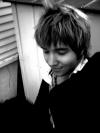| Online: | |
| Visits: | |
| Stories: |
If You Free How You See, You Yourself Become Free
By Adam J. Pearson

If we look at our fellow human beings and see only bodies to be judged and evaluated, then we do not see them at all; we are worse than blind, for we see only surfaces and miss the great depths below, like mistaking the tips of icebergs for all that they are and thereby missing the vastness below the waves.

Our shallow popular culture is a product of this fundamental blindness, this failure to see the greatness and vastness that we are. Its superficial vision, emptiness of meaning, and misplaced values are themselves the innocent children of deep-seated shame, fear, judgment, and anxiety. Our culture of surfaces is the product of inward shallowness; lost minds and alienated hearts produce music, movies, and literature in their own image. In the absence of value, meaning, and vastness, we are encouraged to look to surfaces to fill the void within, all to no avail.

We who wish to see must be willing to question the lenses our culture offers us as tools through which to see. We must open our minds to the vastness of feelings, ideas, memories, dreams, passions, and imaginings that lies beneath our surfaces. We must open open our hearts to empathy, compassion, and connection. We must expand our awareness to mindfully include as much of the present moment as possible.

We who wish to see must live consciously, rather than on autopilot, and reflect rather than blindly receive the messages that our culture provides. In short, we must refuse to live our lives asleep and thereby, barely live at all. We must awaken and strive to see beyond appearances and the illusions of separation that invite judgment and fear. We must be willing to find freedom from fear by daring to love and having the courage to be vulnerably authentic. Above all, we must want to see the vastness of what is and of what we are. We are greater and capable of far more than we now think we are.

In truth, every individual is infinite. To see our vastness, we need only relinquish the illusions of boundaries and separateness we seem to see.
When we free our vision by releasing the thoughts we use to limit each other, we are seen as we really are: infinite, boundary-less, and vast beyond all comprehension.
By freeing our seeing, we are ourselves freed, just as by forgiving others, we are ourselves forgiven.
When we do not impose judgments and thus reduce each other to limiting ideas, we free people to be more than our limiting thoughts would have allowed them to be.
In short, if you free how you see, you yourself become free.
Read More from Adam Pearson at http://philosophadam.wordpress.com/
Source: https://philosophadam.wordpress.com/2014/12/18/if-you-free-how-you-see-you-yourself-become-free/




